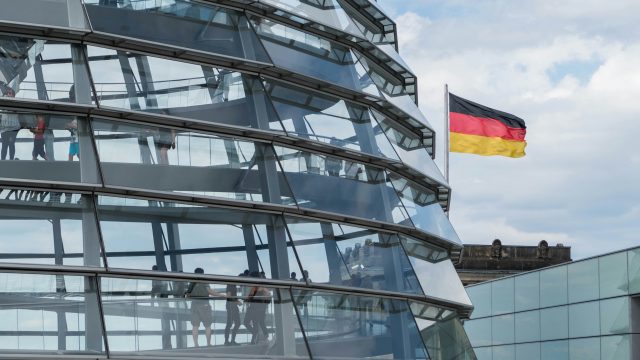A political earthquake in Germany: what does it mean for green?
We take a closer look at the German election results to understand how they might impact green energy policies and our priorities.

Germany is in the maelstrom of a number of important trends/themes that are currently pressuring European economies: expensive fuel partly due to war in Ukraine, a lack of energy security, the collapse of living standards and the rise of the far right. In this article our Director of Engagement Jean McLean takes a closer look at the German election results to understand how they might impact green energy policies and the GEC's priorities.
The results of this week’s German federal elections have dramatically shifted the country's political landscape, with potential ramifications for the clean energy transition in the country that had long been seen as a renewables pioneer. As the United States is captured by Muskovite disruption, and other countries in Europe and beyond grapple with the rise of right-wing populism, will Germany’s example set a trend for other governments and political parties to slide rightwards?
Election outcomes and their implications
Under Germany’s multi-party, proportional representation electoral system, it is very difficult for any one party to secure an overall majority, and so coalition governments are formed to allow a workable government to pass legislation. This year, the Christian Democratic Union (CDU), led by Friedrich Merz, captured the single largest vote share with approximately 28.6% of the vote. But although this putatively means they “won” the election, this is also the second-worst result in the party’s history, and – given electoral eligibility and turnout rates – means that only about one person in every six actually voted for the “winning” party.
Still, the other major parties did even worse, and this relative success positions Merz to become Germany's next Chancellor. The election’s biggest success story – if you can call it that – comes from the far-right Alternative for Germany (AfD), who made substantial gains and doubled their support to around 20%, reflecting a surge in nationalist sentiments.
“ Focusing on influencing the policy agenda and the political rhetoric of the centre right is a critical firewall against the spread of far right beliefs and policies.”
The CDU's platform emphasized economic growth, proposing standard centre-right mainstays like tax cuts and business deregulation. While the party has committed to achieving climate neutrality by 2045, its approach to climate policy is expected to be more market-driven, potentially reducing the emphasis on stringent environmental regulations, taking a slower pace to transition and revisiting energy decisions. The governing centre-left Social Democratic Party (SDP) fell to third place, reflecting growing dissatisfaction with the policies on offer.
The Greens experienced a slight decline in their vote share, falling from 15% to 12% which may translate to diminished influence in the upcoming government and more impetus to deceleration in the pace of Germany's energy transition.
Election Takeaways
So what can we learn from all this?
The far right are making political weather. Like in many other countries the issue of immigration as promoted by far right parties and then aped by many other political parties is dominating the political debate. However the biggest threat to centre-left governments and policies is not the radical right, but viable centre-right parties (CDU) and other parties to their left (Greens, Die Linke; BSW in some regards). The far-right mostly feeds on the centre-right & non-voters.
This is a pattern that we see repeated for Reform voters in the UK. The sources of their votes are voters shifting from other parties and non-voters, pointing to wider dissatisfaction with the political choices on offer. Non-voters are unreliable but this shift is not meaningless.

In this environment focusing on influencing the policy agenda and the political rhetoric of the centre right is a critical firewall against the spread of far right beliefs and policies. As is expanding the left flank of these discussions, in a way that resonates with voters and their experiences.
Unhappiness with the status quo. This election took place under prime conditions for the AfD and yet they got 20% of the vote. This should not generate complacency, as the policy agenda has been dragged to the right. The centre-left needs to think critically about how to open up political space to the left and build short- and long-term support for different solutions and explanations for what is happening. Prioritising social, economic and environmental stability is key for political parties and finding tangible benefits for households the work of policy experts.
Mainstream political parties need to recognise that their “business as usual” approach is deeply uncompelling to voters facing a cost-of-living crisis and the biggest collapse in household living standards since the Second World War. The SDP in government failed to offer viable meaningful alternatives that voters believe are commensurate to dealing with the stress, hardship and the economic pain faced by many.
The youth votes reinforce this disenchantment with these age groups voting for the far right and left.
The challenge now may be to ensure that an additional money that is found in this political context isn’t used solely for military spending but is also deployed to invest in a more just and sustainable future.
Disinformation as an electoral norm. The role of AI, and social media in effecting and influencing voters is growing more and more sophisticated. Increasingly enabled by poor regulation and limited self-policing by social media companies, online activity in particular this time round hate-speech failures by Meta and X build on from experiences in the Philippinessmisinformation in India on and Nigerian influencers continue to play a negative role on elections . Civil Society Organisations (CSOs), governments and social media companies need to revisit the role of social media in elections and lawmakers must establish minimum standards.
The importance of winning the energy transition narrative war. CSOs need to highlight that voters still believe that the climate is important even if temporarily other issues have increased importance and that it is too costly to households not to transition in a safe, sustainable and planned way. Adopting policies that promote a homegrown energy policy mix, make economic sense to households, as well as promoting renewable energy and energy efficiency. Telling the positive story of transition builds momentum for the transition.
The 2025 German elections have introduced significant new complexities into the country's approach to the green energy transition – including the potential for false cautionary tales about the speed of transition. While the CDU's victory may lead to a more market-oriented and potentially slower transition, the enduring commitment to climate neutrality by 2045 provides a foundation for continued progress. However, if political parties fail to respond to the need of the public, this foundation could not only unravel but reverse. By adopting inclusive and evidence-based strategies, we can build public support for green economies and ensure that sustainable development remains a central priority but only if we recognise what the real mistakes are and challenge ourselves to do more for voters.
- Jean McLean, GEC


